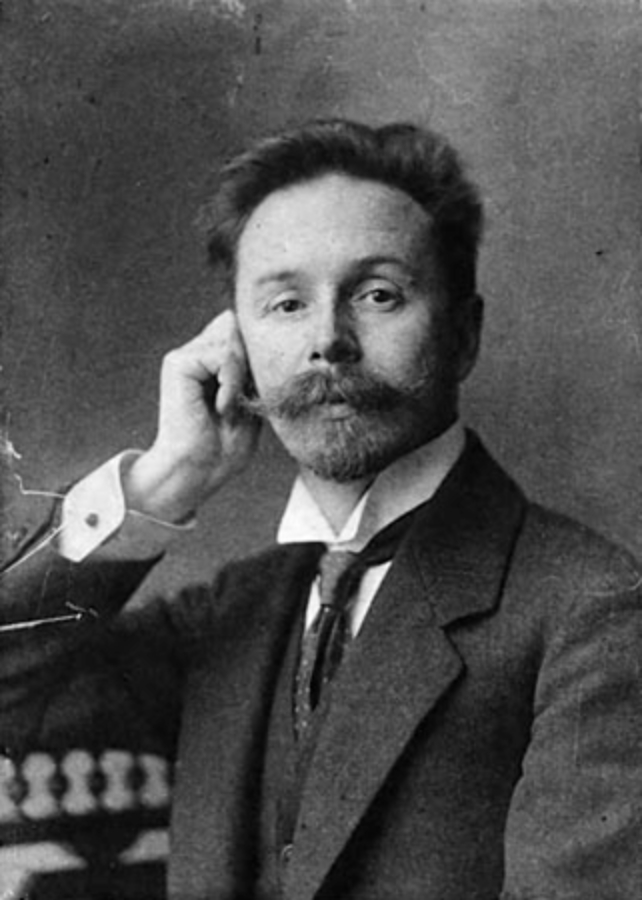Alexander Scriabin
 Alexander Nikolayevich Scriabin, ; , , scientific transliteration: ''Aleksandr Nikolaevič Skrjabin''; also transliterated variously as Skriabin, Skryabin, and (in French) Scriabine. The composer himself [https://commons.wikimedia.org/wiki/File:Scriabin_Signature.png used the French spelling "Scriabine"], which was also the most popular spelling used in English-language publications during his lifetime. First editions of his works used the Romanizations "[http://imslp.org/wiki/File:SIBLEY1802.19196.ea23-39087012660033score.pdf Scriabine]", "[http://imslp.org/wiki/File:SIBLEY1802.15557.d4ec-39087012659969score.pdf Scriàbine]", and "[http://imslp.org/wiki/File:SIBLEY1802.18988.fb0f-39087012479731score.pdf Skrjábin] ".|group=n}} () was a Russian composer and virtuoso pianist. Before 1903, Scriabin was greatly influenced by the music of Frédéric Chopin and composed in a relatively tonal, late-Romantic idiom. Later, and independently of his influential contemporary Arnold Schoenberg, Scriabin developed a much more dissonant musical language that had transcended usual tonality but was not atonal, which accorded with his personal brand of metaphysics. Scriabin found significant appeal in the concept of Gesamtkunstwerk as well as synesthesia, and associated colours with the various harmonic tones of his scale, while his colour-coded circle of fifths was also inspired by theosophy. He is often considered the main Russian Symbolist composer and a major representative of the Russian Silver Age.
Alexander Nikolayevich Scriabin, ; , , scientific transliteration: ''Aleksandr Nikolaevič Skrjabin''; also transliterated variously as Skriabin, Skryabin, and (in French) Scriabine. The composer himself [https://commons.wikimedia.org/wiki/File:Scriabin_Signature.png used the French spelling "Scriabine"], which was also the most popular spelling used in English-language publications during his lifetime. First editions of his works used the Romanizations "[http://imslp.org/wiki/File:SIBLEY1802.19196.ea23-39087012660033score.pdf Scriabine]", "[http://imslp.org/wiki/File:SIBLEY1802.15557.d4ec-39087012659969score.pdf Scriàbine]", and "[http://imslp.org/wiki/File:SIBLEY1802.18988.fb0f-39087012479731score.pdf Skrjábin] ".|group=n}} () was a Russian composer and virtuoso pianist. Before 1903, Scriabin was greatly influenced by the music of Frédéric Chopin and composed in a relatively tonal, late-Romantic idiom. Later, and independently of his influential contemporary Arnold Schoenberg, Scriabin developed a much more dissonant musical language that had transcended usual tonality but was not atonal, which accorded with his personal brand of metaphysics. Scriabin found significant appeal in the concept of Gesamtkunstwerk as well as synesthesia, and associated colours with the various harmonic tones of his scale, while his colour-coded circle of fifths was also inspired by theosophy. He is often considered the main Russian Symbolist composer and a major representative of the Russian Silver Age.Scriabin was an innovator as well as one of the most controversial composer-pianists of the early 20th century. The ''Great Soviet Encyclopedia'' said of him, "no composer has had more scorn heaped on him or greater love bestowed." Leo Tolstoy described Scriabin's music as "a sincere expression of genius." Scriabin's oeuvre exerted a salient influence on the music world over time, and inspired composers such as Igor Stravinsky, Sergei Prokofiev, and Karol Szymanowski. But Scriabin's importance in the Russian (subsequently Soviet) musical scene, and internationally, drastically declined after his death. According to his biographer Faubion Bowers, "No one was more famous during their lifetime, and few were more quickly ignored after death." Nevertheless, his musical aesthetics have been reevaluated since the 1970s, and his ten published sonatas for piano and other works have been increasingly championed, garnering significant acclaim in recent years. Provided by Wikipedia
Showing 1 - 20 results of 74 for search 'Scriabin, Aleksandr Nikolayevich, 1872-1915', query time: 0.15s
Refine Results
-
1by Scriabin, Aleksandr Nikolayevich, 1872-1915
Published 1974Call Number: Loading...
Located:Loading...Musical Score Book Loading... -
2by Scriabin, Aleksandr Nikolayevich, 1872-1915
Published 1971Call Number: Loading...
Located:Loading...Musical Score Book Loading... -
3by Scriabin, Aleksandr Nikolayevich, 1872-1915
Published 1970Call Number: Loading...
Located:Loading...Musical Score Book Loading... -
4by Scriabin, Aleksandr Nikolayevich, 1872-1915Other Authors: “...Scriabin, Aleksandr Nikolayevich, 1872-1915...”
Published 1995
Call Number: Loading...
Located:Loading...Musical Score Book Loading... -
5by Scriabin, Aleksandr Nikolayevich, 1872-1915
Published 1996Call Number: Loading...
Located:Loading...Musical Score Book Loading... -
6by Scriabin, Aleksandr Nikolayevich, 1872-1915
Published 1988Call Number: Loading...
Located:Loading...Musical Score Book Loading... -
7by Scriabin, Aleksandr Nikolayevich, 1872-1915
Published 1991Call Number: Loading...
Located:Loading...Musical Score Book Loading... -
8by Scriabin, Aleksandr Nikolayevich, 1872-1915Other Authors: “...Scriabin, Aleksandr Nikolayevich, 1872-1915...”
Published 1973
Call Number: Loading...
Located:Loading...Musical Score Book Loading... -
9Call Number: Loading...
Located:Loading...CD Audio Loading... -
10by Scriabin, Aleksandr Nikolayevich, 1872-1915
Published 1965Call Number: Loading...
Located:Loading...Book Loading... -
11by Scriabin, Aleksandr Nikolayevich, 1872-1915
Published 1917Call Number: Loading...
Located:Loading...Musical Score Book Loading... -
12by Scriabin, Aleksandr Nikolayevich, 1872-1915
Published 1943Call Number: Loading...
Located:Loading...Musical Score Book Loading... -
13by Scriabin, Aleksandr Nikolayevich, 1872-1915
Published 1943Call Number: Loading...
Located:Loading...Musical Score Book Loading... -
14by Scriabin, Aleksandr Nikolayevich, 1872-1915Other Authors: “...Scriabin, Aleksandr Nikolayevich, 1872-1915...”
Published 1989
Call Number: Loading...
Located:Loading...CD Audio Loading... -
15by Scriabin, Aleksandr Nikolayevich, 1872-1915
Published 1943Call Number: Loading...
Located:Loading...Musical Score Book Loading... -
16by Scriabin, Aleksandr Nikolayevich, 1872-1915
Published 1942Call Number: Loading...
Located:Loading...Musical Score Book Loading... -
17by Scriabin, Aleksandr Nikolayevich, 1872-1915
Published 1944Call Number: Loading...
Located:Loading...Musical Score Book Loading... -
18by Scriabin, Aleksandr Nikolayevich, 1872-1915
Published 1943Call Number: Loading...
Located:Loading...Musical Score Book Loading... -
19by Scriabin, Aleksandr Nikolayevich, 1872-1915
Published 1943Call Number: Loading...
Located:Loading...Musical Score Book Loading... -
20by Scriabin, Aleksandr Nikolayevich, 1872-1915
Published 1949Call Number: Loading...
Located:Loading...Musical Score Book Loading...
Search Tools:
RSS Feed
–
Email Search
Related Subjects
Piano music
Sonatas (Piano)
Piano music, Arranged
Concertos (Piano)
Variations (Piano)
Waltzes
Live sound recordings
Mazurkas
Symphonic poems
Piano, Musique de
Suites (Piano)
Polonaises
Composers
Music
Orchestral music
Piano
Sonates (Piano)
Ballades (Instrumental music)
Canons, fugues, etc. (Piano), Arranged
Cantatas, Secular (Mixed voices) with orchestra
Concertos (Violin)
Concertos (Violon)
Dance music
Danse, Musique de
Etudes (Piano)
Excerpts
Folk songs
History and criticism
Marches (Piano)
Marches (Piano), Arranged